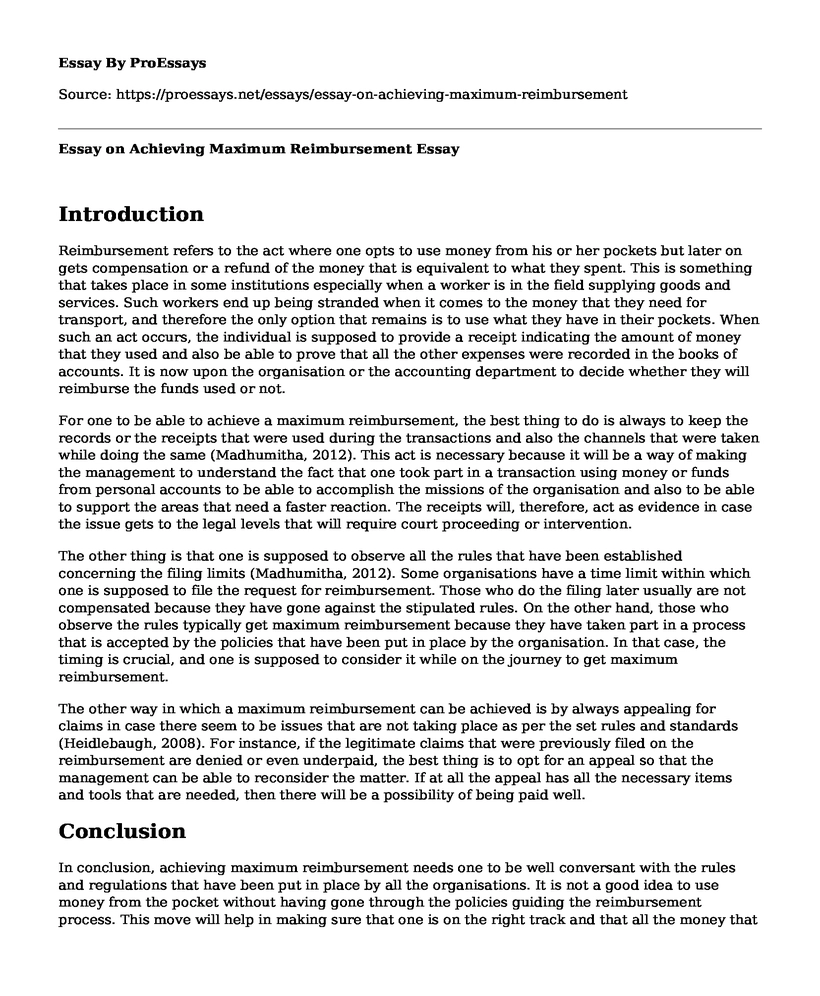Introduction
Reimbursement refers to the act where one opts to use money from his or her pockets but later on gets compensation or a refund of the money that is equivalent to what they spent. This is something that takes place in some institutions especially when a worker is in the field supplying goods and services. Such workers end up being stranded when it comes to the money that they need for transport, and therefore the only option that remains is to use what they have in their pockets. When such an act occurs, the individual is supposed to provide a receipt indicating the amount of money that they used and also be able to prove that all the other expenses were recorded in the books of accounts. It is now upon the organisation or the accounting department to decide whether they will reimburse the funds used or not.
For one to be able to achieve a maximum reimbursement, the best thing to do is always to keep the records or the receipts that were used during the transactions and also the channels that were taken while doing the same (Madhumitha, 2012). This act is necessary because it will be a way of making the management to understand the fact that one took part in a transaction using money or funds from personal accounts to be able to accomplish the missions of the organisation and also to be able to support the areas that need a faster reaction. The receipts will, therefore, act as evidence in case the issue gets to the legal levels that will require court proceeding or intervention.
The other thing is that one is supposed to observe all the rules that have been established concerning the filing limits (Madhumitha, 2012). Some organisations have a time limit within which one is supposed to file the request for reimbursement. Those who do the filing later usually are not compensated because they have gone against the stipulated rules. On the other hand, those who observe the rules typically get maximum reimbursement because they have taken part in a process that is accepted by the policies that have been put in place by the organisation. In that case, the timing is crucial, and one is supposed to consider it while on the journey to get maximum reimbursement.
The other way in which a maximum reimbursement can be achieved is by always appealing for claims in case there seem to be issues that are not taking place as per the set rules and standards (Heidlebaugh, 2008). For instance, if the legitimate claims that were previously filed on the reimbursement are denied or even underpaid, the best thing is to opt for an appeal so that the management can be able to reconsider the matter. If at all the appeal has all the necessary items and tools that are needed, then there will be a possibility of being paid well.
Conclusion
In conclusion, achieving maximum reimbursement needs one to be well conversant with the rules and regulations that have been put in place by all the organisations. It is not a good idea to use money from the pocket without having gone through the policies guiding the reimbursement process. This move will help in making sure that one is on the right track and that all the money that is used will be reimbursed in time without any issues coming up in the process. If at all the stated measures are adhered to, then achieving a maximum reimbursement will be possible.
References
Heidlebaugh, J. J. (2008). "10 billing and coding tips to boost your reimbursement." The Journal of Family Practice.
Madhumitha. (2012). Getting Maximum Reimbursements in Medical billing." Ecare India Blog.
Cite this page
Essay on Achieving Maximum Reimbursement. (2022, May 16). Retrieved from https://proessays.net/essays/essay-on-achieving-maximum-reimbursement
If you are the original author of this essay and no longer wish to have it published on the ProEssays website, please click below to request its removal:
- Essay Example: Partial Debt Relief for Students
- Maconie Inc. Corporate Finance Paper Example
- Essay Example on Central Bank Benefits: Inflation, Growth, and Interest Rates
- Stock Prices Reflect Data: Productive Market Hypothesis - Essay Sample
- Essay Sample on Managed Care Redefines Health Insurance: Eliminating Generalization by Practitioners
- Essay Example on Organizational Culture: A Key Factor in Success and Fraud
- Report Sample on Gillette Stadium: Home to Patriots & Revolution in Foxboro, MA







